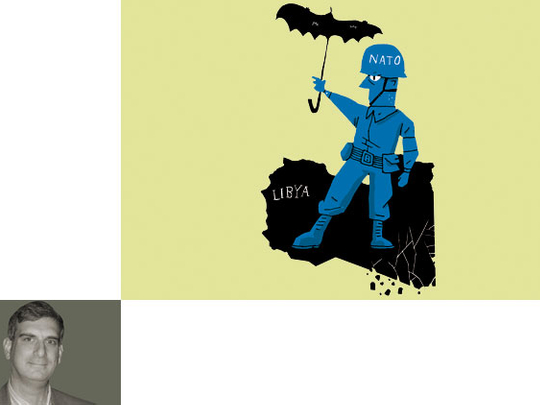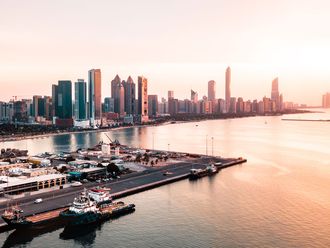
From the perspective of the western allies, the Libya intervention suddenly looks successful. Commentary in Washington and London has been very self-congratulatory. I don't read French, but am willing to wager that the Paris newspapers are taking a similar approach to the Fall of Sirte, death of Muammar Gaddafi and the National Transitional Council's (NTC) declaration of Libya's ‘liberation'.
Indeed, the haste with which Nato leaders moved to announce their exit from Libya effective Monday, bordered on the unseemly, especially since the NTC itself was publicly calling on Nato to stay on until the end of the year and expand its mission to include securing the country's borders.
A cynic might argue that the very speed of Nato's exit from Libya represents a kind of implicit acknowledgement that things did not go nearly as smoothly as the operation's proponents anticipated. The western public (i.e. voters) was promised a humanitarian mission lasting, at most, a few weeks and found themselves involved instead in a bitter civil war whose endgame remained in question for months on end.
Even now Nato leaders are undoubtedly haunted by the possibility that the celebrations of the last 10 days may soon give way to a new round of fighting. Better, surely, to "declare victory and withdraw," as a wise Vietnam-era senator once urged US president Lyndon Johnson to do, while such a declaration can be made with a straight face.
What remains unclear are what lessons, exactly, Nato learned from its Libyan adventure.
For the sake of argument let's accept, for the moment, the triumphalist case.
Libya, according to this theory, is a rousing success. Nato's actions there validate the western doctrine known as the ‘responsibility to protect'. Developed in the wake of the Rwandan genocide and the Balkan wars of the 1990s, this theory holds that absolute sovereignty is an outmoded concept and that states forfeit their right to do as they wish inside their own borders when they savagely attack innocent civilians.
Even if one accepts the premise that the allied involvement in Libya began mainly as a well-intentioned effort to protect civilians, it was surely clear as spring turned to summer that the mission had been broadened and its public justification was increasingly preposterous.
That, in turn, raises some difficult questions. For obvious political reasons, Nato has never acknowledged that whatever motives drove its Libya intervention at the outset, within a matter of weeks it had become one side's ally in a Libyan civil war.
The removal of Gaddafi may never have officially been part of the alliance's mission, but one would be hard-pressed to find anyone today who does not acknowledge, privately at least, that regime change soon became the goal.
Expensive campaign
And removing Gaddafi, as we now know, proved to be a far more difficult proposition than most western observers bargained for back in March. The apparently genuine gratitude many Libyans feel for the assistance of Nato and its Arab allies should not obscure the fact that everything in Libya took longer, cost more money and turned out to be more politically difficult than anyone predicted on the way in.
The result is that while people were all smiles at the alliance's Brussels headquarters last week, the long-term achievement of the Libya mission may be to ensure that Nato thinks carefully about doing anything like this again anytime soon.
It is one of the oldest maxims of war-making that the best laid battle plan rarely survives the first contact with the enemy. Libya proved once again how true this is. It was, from the West's perspective, about as easy a foreign intervention as one could hope to find: conveniently close to Nato's bases in Europe, presenting little in the way of difficult terrain and targeting a mostly friendless dictator presiding over a weak patchwork of a country.
So success, yes, but success freighted with cautionary lessons for the future. That includes the knowing that the new Libya may collapse back into civil war. If that happens the alliance will face an agonising choice: whether to stand aside as blood flows and refugees again make their way across the Mediterranean — or to intervene again, but this time in circumstances far more messy, and far less clear-cut, than when the enemy was the little-loved Gaddafi regime.
Thus, over the weekend, it was a bit poignant to see protesters in Syria calling for a Libya-style ‘no-fly zone' to protect them from the brutal repression of Bashar Al Assad's regime even as exiled opposition leaders sagely debated whether to call for foreign military intervention.
It was also a bit absurd to see Al Assad himself, in a British newspaper interview, pronounce bellicose warnings against foreigners who might want to assist the protesters.
In that interview Al Assad tried to discredit the demonstrators calling for his ouster with the absurd claim that all of them are either members of or sympathetic to Al Qaida.
He needn't have bothered. The Syrian president surely knows — and the protesters and opposition leaders alike ought by now to realise — that no foreign help is coming.
Gordon Robison, a longtime Middle East journalist and commentator, teaches political science at the University of Vermont.










